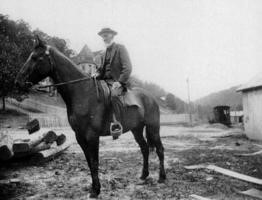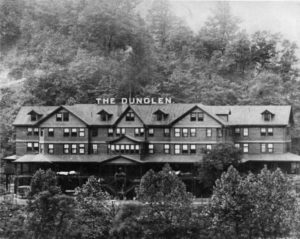By Isaac Fornarola
Thurmond is a formerly-thriving coal mining town in Fayette County, West Virginia. In its heyday, it was one of the most prosperous and active towns in the region, producing more revenue from coal than Cleveland, Ohio. But by the mid-20th century, Thurmond was all-but abandoned. Today, only five residents remain.
Researching esoteric moments in history involves a contradiction. The scarcity of physical artifacts means there’s a story that has yet to be told. And yet, the lack of source material means the reporting will be challenging, at times exhausting, and will require searching widely. Even Walter Thurmond, the grandson of the town’s founder, concedes in his book The Logan Coal Field of West Virginia that tracing the region’s early history is a challenge:
“The Pre-Coal Era lasted from the beginning of time until approximately 1900. About most of this vast period we know little indeed. The geologist, the archaeologist and the student of Indian legends have contributed tantalizing clues, but the bulk is lost—doubtless forever.”

W.D. Thurmond, the founder of Thurmond, WV. Source: The West Virginia Encyclopedia
Luckily, much of Thurmond’s birth and growth can be traced through the life of its founder, W.D. Thurmond. In exchange for his service as a surveyor of the New River Gorge, he was granted ownership of 73-acres in the region in 1873. Thurmond was the first to discover coal in the New River field, unearthing it while plowing in his garden.
Still, a complication in researching W.D. is that nearly every search for his name returns information about Strom Thurmond, the infamous senator from South Carolina who opposed the Civil Rights Act by conducting the longest filibuster in U.S. history. After learning that W.D. fought on the Confederate side in the Civil War, I started to wonder whether he was related to Strom. Knowing the name of W.D. Thurmond’s father, Philip, I searched through books about the Thurmond family lineage and was able to determine that Strom Thurmond is W.D. Thurmond’s first cousin twice-removed.
W.D.’s relation to Strom comes as no surprise. W.D. was a staunch southern Baptist who was passionate about the Confederate cause. The National Archives, in conjunction with the National Parks Service, has compiled a database of records of confederate soldiers called the Soldiers and Sailors Database. I searched for W.D. Thurmond and found his unit: the Hounshell’s Batallion of the Virginia Cavalry.
Digging through West Virginia’s E-Encyclopedia, maintained by the West Virginia Humanities Council, I found that W.D. Thurmond and his brother, Philip Thurmond, commanded the unit, part of a larger faction called the Partisan Rangers. The Partisan Rangers were a rogue militia that fought in the mountains and played by their own rules. They weren’t funded or endorsed by the Confederate army: Thurmond was so passionate about preserving the institution of slavery that he took it upon himself to fight independently. W.D. and his brothers fought to preserve slavery until the day of Robert. E. Lee’s surrender, and even on the day of his death in 1910, W.D. refused to sign an oath of allegiance to the Union.
The town’s character and politics evolved despite him, and by the 1920s it was known as a raucous and unruly town. Disregarding W.D.’s prohibition of alcohol, Thomas Gaylord McKell, a wealthy executive who owned much of Thurmond’s real estate, opened the Dunglen Hotel. Though the Dunglen was a destination for wealthy coal executives and high-society businessmen, it was also the site of many murders and thefts.

Source: https://www.theclio.com
Thurmond’s story as a bustling Appalachian town is a microcosm of the larger history of coal towns in Southern West Virginia. Precipitated by the railroad industry’s shift from steam to diesel fuel, the catastrophic collapse of Thurmond and its neighboring towns began in the early 20th-century, and by the 1950s, nearly all banks, hotels, and businesses were abandoned. In its proposal to preserve Thurmond’s structures and landscape, the National Registry of Historic places described the town’s significance to American history:
“Thurmond, West Virginia is historically significant for its extraordinary commercial vitality in the early twentieth century in spite of extreme inaccessibility. For thirty-five years, Thurmond, located in the heart of the New River Gorge, was inaccessible except by railroad…The town had not a single street, yet boasted two banks, two hotels and a thriving commercial block. Architecturally, the town is significant for its railroad architecture…not because they have great style or beauty, but for what they say about the thriving life in the West Virginia coal fields for some sixty years.”
Additional Sources:
- Callahan, James Morton. History of West Virginia, Old and New. American Historical Society, 1923.
- Thurmond, Walter R. The Logan Coal Field of West Virginia; a Brief History. West Virginia University Library, 1964.
- National Register of Historic Places Inventory Nomination Form
- “Share W. D. Thurmond.” West-Virginia-Encyclopedia-Text, www.wvencyclopedia.org/articles/722.
- Amherst County, Virginia Compiled Genealogies.
- The National Archives Soldiers and Sailors Database
- The Thurmonds: A Study In The Genealogy and History of Philip Thurmond of Amherst County, Virginia and his descendants. Microfilm, Genealogical Society of Utah
- The Library of Congress Photography Archives
- Newspapers.com: Archives of The Wheeling Daily Intelligencer, The Charleston Daily Mail and others.
One of the most accurate and authoritative accountings can be found in THE THURMONDS of VIRGINIA__authored by Walter Robert Thurmond Witschey (his mother ELIZABETH
THURMOND WITSCHEY, grandfather WALTER RIPPETOE THURMOND, great grandfather, JOSEPH
SAMUEL THURMOND.) I AM SALLIE WITSCHEY HART, Walter’s sister.